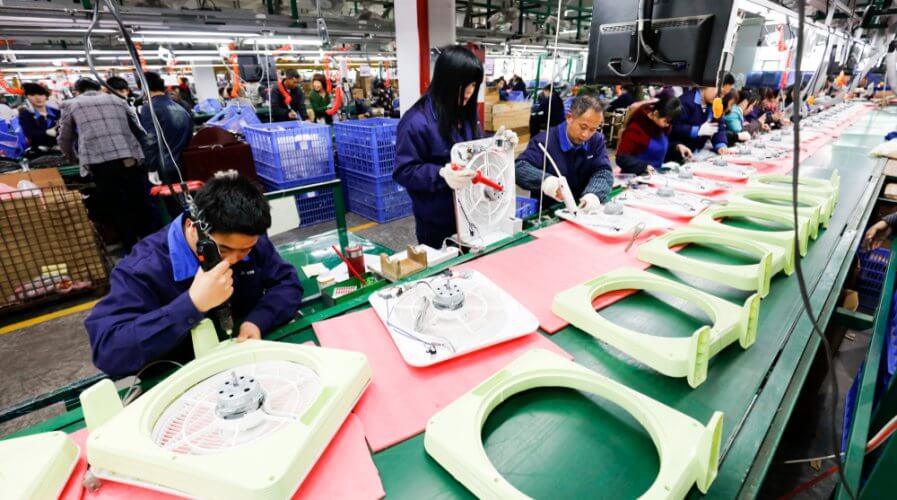
Chinese ICT manufacturers and vendors will suffer as a result of the US-China trade war. Source: Shutterstock
Will the US-China trade war impact the Made in China 2025 initiative?
DEFINITELY. The US-China trade war will significantly and negatively impact the Made in China 2025 initiative. There’s no doubt about that.
The initiative is a priority for China who aspires to become a world leader in producing tech by 2025. It focuses on 10 key sectors such as next-generation information technology, high-end numerical control tools and robotics, aerospace, and ocean engineering to name a few.
As always, China’s ambitious goals aren’t just talk. It has established five national and 48 provincial manufacturing innovation centres and expects to set up another 35 national manufacturing innovation centres by 2025.
The government has also lined up funds to support its ambitious 2025 project. “Subsidies, loans and bonds worth around US$1.5 billion have been set aside to pursue the Made in China 2025 objectives, with another US$1.6 billion coming from local governments,” according to the South China Morning Post.
Since the list of US$34 billion Chinese products targeted by new US tariffs include robotics, aviation and aerospace, industrial machinery, automobiles, and LED light bulbs, it will significantly impact China’s plan for technological advancement.
Of the 1,102 categories of products targeted in the new US tariffs list, only 1 percent are consumer goods. The remaining are products in the secondary sector and related to the areas identified and encouraged by the Made in China 2025 initiative.
According to IDC China’s research, the imposition of tariffs by the U.S. and China on US$34 billion worth of products from each side will bring down China’s GDP growth in 2018 by 0.2 percentage points (from 6.7 percent to 6.5 percent) by affecting approximately US$25 billion of GDP.
Specific to China’s ICT market, the overall growth in 2018 will decline by 0.6 percentage points (from to 9.0 percent to 8.4 percent), with approximately US$4 billion of market being affected.
IDC, who carefully studied the impact of the trade war on China’s ICT market, found three causes for concern:
- Impact of the US tariffs on Chinese goods and industries,
- Impact of exchange rate changes on Chinese industries if Renminbi depreciates, and
- Impact on China from US goods affected by Chinese tariffs.
According to IDC’s study, the trade war will directly and indirectly impact all industries of the Chinese economy.
However, it seems as though the manufacturing industry will be hit the most, especially in those areas related to the Made in China 2025 industrial policy, and the services sector, especially technology services.
The Chinese ICT market is expected to suffer a greater negative impact from the trade war than China’s national GDP because the outlook of a lower GDP growth will affect ICT purchase and a cheaper Renminbi will significantly increase the overall cost of China’s ICT industry that rely heavily on imported technologies.
According to IDC, these are are some steps and thoughts for ICT vendors to see through the trade war, and ensure their business is able to stay afloat.
#1 | Closely follow the latest developments of the US-China trade war and their impact on the industries: Whether the U.S. will follow through on the proposed tariffs on US$200 billion worth of Chinese goods and when, what retaliatory actions China will take and when, and what industries will be involved and the specific impact.
#2 | Make proper adjustment to the export and globalization strategy: Make full use of national policy related to globalization and increase market expansion in the EU and countries through the Belt and Road initative.
#3 | Appropriately control the overall cost: For companies that rely on U.S. imports for core components, the depreciation of Renminbi will increase their cost. Therefore, appropriate cost control will be a key measure in response to the crisis.
#4 | Continuously invest in core technologies and digital transformation: The digital economy will maintain high-speed growth in China and globally. Increasing investment in strategic areas at a time when the overall economy is facing challenges will build foundation for future growth.
READ MORE
- Ethical AI: The renewed importance of safeguarding data and customer privacy in Generative AI applications
- How Japan balances AI-driven opportunities with cybersecurity needs
- Deploying SASE: Benchmarking your approach
- Insurance everywhere all at once: the digital transformation of the APAC insurance industry
- Google parent Alphabet eyes HubSpot: A potential acquisition shaping the future of CRM




